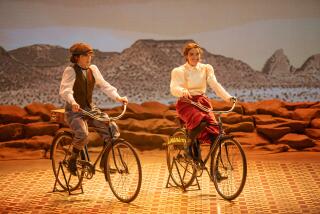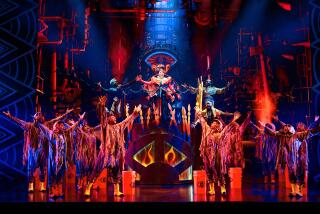Review: Bang on a Can All-Stars launch their ‘Road Trip’ in Hollywood, and it’s a fun ride
Introducing the Bang on a Can All-Stars on Saturday night, the interim director of the Ford Theatres allowed herself a brief moment of gloating. Olga Garay-English announced that she had scooped the Brooklyn Academy of Music for the world premiere of “Road Trip,” the work celebrating the 30th anniversary of the New York composers collective Bang on a Can, originally meant for BAM but now not arriving there until Oct. 27.
With the news, the surrounding hills came alive with the sound of rabid cheering. So what if said cheering came from the Hollywood Bowl on the other side of the Cahuenga Pass, where a different road trip, Depeche Mode’s Global Spirit tour, was in progress? Nothing could take away from Bang on a Can’s global spirit.
The scoop for Los Angeles County’s newly refurbished and newly ambitious outdoor venue was, in fact, entirely in character with Bang on a Can. If David Lang, Julia Wolfe and Michael Gordon — the collective’s founding composers — have done anything (and they’ve done a lot), they have, from Day 1, been new music’s uniquely potent ZIP Code zappers.
Thirty years ago, Manhattan (and by extension the new music world) was divided into Uptown and Downtown music. That stood for the academic dogma at Columbia verses the rebellious experimental scene in SoHo. Bang on a Can began as a gutsy, funky marathon of new music in which the three composers, with the seemingly naive idealism of new Yale graduates, thought they’d try a one-time experiment of welcoming all.
They’re still doing marathons, and nobody anymore talks about Uptown or Downtown. The All-Stars (cello, bass, keyboard, percussion, electric guitar, clarinet and sound engineer) were created simply because those were the musicians on hand. Now it’s an internationally recognized group, and countless pieces have been written for that combination. “Banglewood,” a new music program for young musicians, is held at the Massachusetts Museum of Contemporary Art every summer, near Tanglewood.
But, perhaps, the outfit’s most lasting influence is the ubiquity of banging on a proverbial can. Thanks to the Bang on a Can example, composers and performers have taken back the new music scene from the establishment. Without its artistic DIY influence, Brooklyn might be just another place for hedge-fund hipsters and self-important restaurants.
Meanwhile, the establishment has followed suit with its own can banging. Lang has won a Pulitzer Prize and been a Carnegie Hall composer-in-residence. Wolfe is the hottest composer in America at the moment. She took home a Pulitzer and a Herb Alpert Award in 2015 and earned a MacArthur fellowship the following year. She has been prominent locally with recent performances of the cantata “Anthracite Fields” by the Los Angeles Master Chorale and the theater piece “Steel Hammer” at UCLA. Last Monday, the Pacifica Quartet and cellist Johannes Moser gave the West Coast premiere of her splendid “Splendid Hopes” at the Segerstrom Center for the Arts, which commissioned it.
As for “Road Trip,” it’s Bang on a Can all the way, which is to say that however individual the voices of Lang, Wolfe and Gordon, the composers have remained close (Wolfe and Gordon are married) and noncompetitive. Nor have they lost their sense of humor or suspicion of excessive professional polish.
Typically, the three divvied up the nine sections without taking credit for who wrote what. Sometimes it was pretty easy to tell, other times not so easy, particularly when the All-Stars — loudly, well and gratefully (given Depeche Mode across the street) amplified — rock out as though they own it all.
It’s a festive road trip with video projected on 11 irregular triangular screens hanging over the stage of, well, road trip footage (much of it looking, as my wife noted, not all that different from a traffic-infested drive to the venue). Lasers and strobe lights add a rock star glamour. None of this was particularly objectionable, except when the strobes got so bright as to seem harmful. Still, I found simply watching the thrilling band the most enjoyable visual component.
When it came to sharing the driving, I’m guessing that the times when the engine whined loud, reaching an ecstatic pitch, Gordon was at the wheel. For the section called “Under the Stars,” a bonfire was projected overhead and the players all took up interestingly tuned ukuleles, each inhabiting its own rhythmic orbit. That was probably Wolfe’s doing. In what was clearly Lang’s “We Are Driving,” bass player Robert Black intoned a road-trippy text, a litany of passing such sites as the Shamrock Bar and the best taco place in the world.
Ultimately, I’m not so sure BAM will care that this “Road Trip” began on the West Coast. In what is also typical of Bang on a Can, the celebration is meant more as a party in which everyone joins in rather than some great statement of intent. Or rather, that is the statement of intent.
Earlier in the week at Segerstrom, “Splendid Hopes” turned out to be an occasional piece as well, a companion to Schubert’s otherworldly String Quintet in C Major. Again, Wolfe didn’t compete. Rather, she offered an inward study in sonorities that began with a shutter (in the form of shaking tremolos) and ended with droning stillness. Her heavy chords infused the Samueli Theater with marshmallow-thick string richness, serving as a kind of healing sonic foam setting the scene for an exquisitely resolute Schubert performance.
Once more, Wolfe demonstrated that with Bang on a Can, it’s never been the can that matters, but what’s inside. The main thing that’s changed over 30 years is the ever-improving quality of the ingredients.
More to Read
The biggest entertainment stories
Get our big stories about Hollywood, film, television, music, arts, culture and more right in your inbox as soon as they publish.
You may occasionally receive promotional content from the Los Angeles Times.







